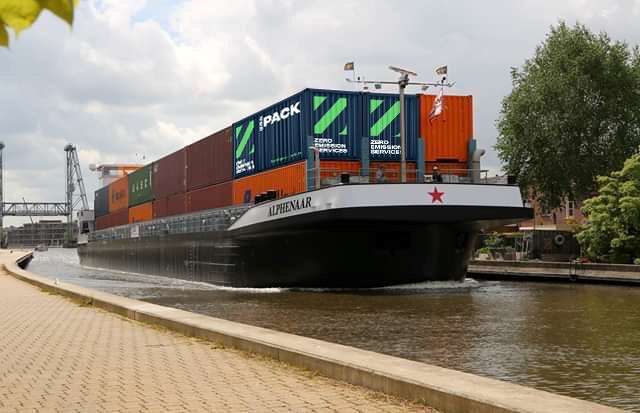A joint venture zero emissions company is aiming to create the conditions that will make a significant shift for inland and coastal shipping to renewable electric power with a network of charging points and easily replace energy packs in containers.
Four European companies supported by the Dutch Ministry of Infrastructure and Water Management have launched a new company that will reduce carbon emissions from inland vessels to zero.
In a first step to its ultimate goal Zero Emission Services (ZES) has fitted the electric powered inland barge De Alphenaar with ZES power-packs that will provide the energy for the vessel’s operations in Europe’s inland waterways.
Two containers, ZES Packs, will be leased as the vessel shifts beer from the Heineken brewery in Alphen aan de Rijn to the port of Moerdijk, south of Rotterdam, a distance of around 80km.
ZES plans to use this concept to move the entire inland navigation and short sea sector towards emission-free sailing.
“The first loading point will be along the Zoeterwoude – Alpherium – Moerdijk corridor. Next, the focus will be on setting up an Amsterdam-Rotterdam-Antwerp corridor and making a connection to Nijmegen. In the first phase the emphasis will be on converted and newly built inland container ships,” said the company.
According to ZES, in the initial phase “The network of charging stations will be gradually expanded to form a national grid of approximately 20 charge points.”
Two ZES Packs will give an inland vessel a range of around 50 to 100km depending, among other factors, on the currents and the vessel’s size and draught.
The company added, “ZES will initially be limiting its focus to the container inland shipping segment. By 2030, the company expects that around 150 inland vessels will be powered by the new battery containers.”
Launched on 2 June the company expects the De Alphenaar to be joined by another five barges during 2021, while the first ZES charging station will be opened in Alphen aan de Rijn.
The network of charging stations will be gradually expanded to form a grid of approximately 20 charging points.
“By 2030, the company expects that around 150 inland vessels will be powered by the new battery containers,” added the company which claims that each barge will cut 1000tonnes of carbon emissions annually in addition to the cuts in particulates, NOx and SOx emissions.
ZES is a joint venture of ING, Engie, Wärtsilä and the Port of Rotterdam Authority and Heineken is the company’s first client, who have signed a 10-year contract for ZES transport services.

Cora van Nieuwenhuizen, Minister of Infrastructure and Water Management, said: “The Netherlands is frontrunner in sustainable transport by water. Well over 1/3 of all goods and 80% of bulk transportation takes place via inland waterways. Not only does this lessen truck transportation, which reduces traffic, inland vessels also emit significantly less CO2. That advance is extended even further with these new emission-free ships.”
Willem Dedden, CEO of Zero Emission Services, explained that the ZES Packs are charged with sustainably generated power, while a network of open access charging points will be established for exchanging battery containers.
“Depleted ZESPacks are exchanged for full ones, so that ships can sail on quickly, with minimal waiting time,” said Dedden.
The company added that to make the transition to electric power easier the company is offering a ‘pay per use’ financing model.
“As a result, ZES only charges for the cost of consumed renewable energy and a battery container rental fee, so that the skipper’s operating costs remain competitive. However, ships must be equipped with an electric propulsion line,” said ZES.
This systemic change involves a total cost of €20 million (US$22.6 million) for the first phase.







